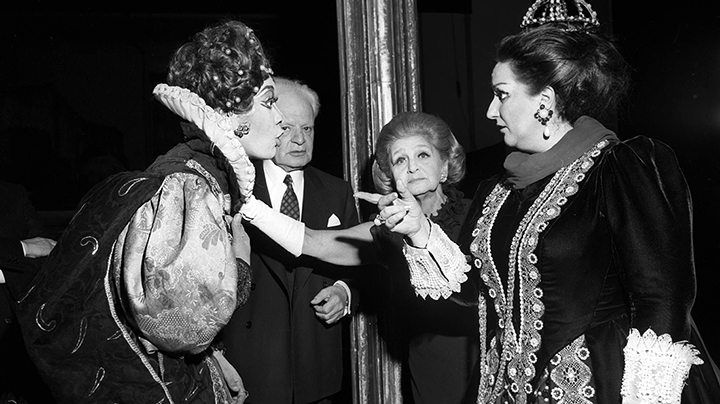
What I remember most is the filth and dementia.
Those were the categories Ethan Mordden had created, or at least codified. Dementia was the highest high to which opera could aspire: the magical nights, the transcendent notes. Filth was, well, the opposite. The two qualities were our yin and yang, opera’s sacred and profane, the sublime and the ridiculous.
When I first stumbled on the parterre website as an early-teenage neophyte in the late ’90s, dementia and filth were the pages I returned to again and again. MP3 audio still seemed exotic at this point, and the audio examples James had chosen crashed out of my computer speakers like an earthquake. This was my introduction to the range of what could be good. Dementia was Cathy Berberian‘s gleeful “Ticket to Ride”; Renata Scotto doing Butterfly and Sonnambula; three — three! — versions of the Elisabetta-Maria face-off from Maria Stuarda: Marisa Galvany and Beverly Sills, Leyla Gencer and Shirley Verrett, Montserrat Caballe and Brigitte Fassbaender. Filth was psychotically wayward singing from the likes of late-career Helga Dernesch and late-career Anna Moffo.
“Even-handed” is not a word that comes up much when people describe parterre, but these pages were also my first introduction to how fair James could be: Renée Fleming was hardly his favorite singer — he and the commenters were mostly merciless to her — but she was there in certifiably “demented” form (as Susannah), just as she was on the filth list for a woefully flat Judy Garland cover that James succinctly dubbed “Under the Rainbow.”
I don’t think I ever commented on parterre. And while I thought that I had contributed a review of something — what, I can’t remember — under the pen name Irma Vêpres, I can’t find it, as hard as I try; maybe I dreamed it. That would be appropriate; there was something dreamlike about parterre for me; reading it online was like spying through a crack in the door of the grail knights’ temple. The rituals going on inside were that serious and strange and irresistible. And James was the high priest, fanning the flame, keeping the stakes sky-high, reassuring everyone that it all still mattered.
And the grail was all that dementia, those thrilling performances we were all looking for, the ones that showed us what was possible, that brought us together: the Renata Scotto Trittico that turned James around in Dallas in 1976; Catherine Malfitano in The Makropulos Case; Callas; Rysanek; Mattila; Millo; Netrebko. For James, those performances were in the past, but they were also in the future. And they didn’t just come from musicians, but also from the brilliant directors — Bieito, Herheim, Tcherniakov — who could make the old fire new.
At its best, parterre was a home for writing that was just as informed and exciting as that. I think of Chris’s dispatches on the Baroque, of Callum Blackmore‘s intensity and thoughtfulness, of Joel Rozen‘s instant-classic, “fuck”-laden tribute to, yes, Renée, in all her greatest and less-than-greatness.
James is no longer with us. But we still have dementia, and we still have filth, and we need them — and parterre — as much as ever.


























Comments